信息管理专业英语实用教程1-10单元课后翻译
信息管理英语教程译文-第四篇

信息管理英语教程_第四篇is a zabra a white animal with black strips?斑马是一个白色有黑条纹的动物吗?Is it a zabra a black animal with white strips或者说是一个黑色有白条纹的动物吗?an anthropologist once questioned a philosopher at a conference about the criteria for sound classification 一位人类学家曾问一位哲学家的一次会议上语音识别的标准二“classification is the sleeping beauty of library and information science”分类是图书馆的睡美人和信息科学Said Hanne Albrechtsen in his personal communication,1997. 1997年Hanne Albrechtsen 在他的个人交流上说道三“In sone ways,at the most technical core of traditional library science,it(classification)stands as a bridge builder between the past and the futrue of our field”susan L Star and Geoffrey C.Bowker commented in their introduction to how classifications work:problems and challenges in an electronic age,1998. Susan L Star and Geoffrey C.Bowker.. susan L Star and Geoffrey C.Bowker1998年介绍他们题为《电子时代匪类是如何发挥作用的:问题与挑战》的书时说,“在某些方面,匪类是传统图书馆学最核心的技术,也是可领域的过去和将来之间的桥梁”四“The Foundation of the library is the book; the foundation of librarianship is classification,”said Arthur Maltby in his book Sayer’s manual of classification of librarianship, fifth edition, first published in 1975 by Andre Deutsch Limited.“图书馆的基础是书;图书馆管理的基础是分类”Arthur Maltby在他的书《塞耶尔图书馆管理的分类指南》第五标准版,1975年由Andre Deutsch Limited第一次发行。
专业英语第一单元翻译

1 . 1 数字计算机数字计算机是处理各种计算任务的数字系统.“数字”的意思是计算机中的信息可由具有部分离散值的变量来表示,这些离散值的内部处理是由具有部分离散状态的部件完成的.例如.十进制数字O , l , 2 ,…9 .即提供了10 个离散值。
第一台电子数字计算机产生于20 世纪40年代末,它主要用于数值计算,那时的离散元素即为数字.为了进行数值计算而产生了数字计算机.实际上.如果只使用两种状态.数字计算机的性能将更可靠。
因为部件的物理约束和人们的逻辑处理需要.所以数字计算机使用具有两种值的离散数据.这种数据称为二进制。
数字计算机使用只有数字O 和l 的二进制数据系统.一个二进制数字称作位.在数字计算机中用一组二进制表示信息。
应用各种编码技术.一组二进制数字不但可以表示二进制数据,而且还可以表示其他离散符号.如十进制数字或字母表中的字母.例如ASCII是用7 位二进制数字表示一个字符。
通过合理使用二进制组合和各种编码技术.可产生用于完成各种类型计算的一系列指令。
与基数为10 的十进制数相比.二进制数的基数为2 .使用了数字O 和1 .与一个二进制数等值的十进制数可以扩展为包含更多位的二进制数.计算机系统是由硬件系统和软件系统组成的,硬件系统由看得见、摸得着的物理设备构成.如磁盘和屏幕。
软件系统是管理计算机的无形“控制”,是运行在计算机中的所有程序,程序是指令的集台,它告诉硬件应该做什么,通常将计算机硬件分为 3 个主要部分:输入和输出设备(I/O 设备)、中央处理器(CPU)和存储器。
在第2 章中对硬件部分进行详细介绍.软件可以按其用途分类。
应用软件是为诸如会计、娱乐和工程领域之类的处理任务而设计的,如果玩过计算机游戏或用字处理软件输入入过文件内容.则用户已经具有使用应用软件的体验。
另一方面.系统软件控制计算机系统,它不仅包括专业人员用于创建应用软件的复杂程序.而且还包括用于启动计算机和提供给其他程序使用的管理程序.这部分内容将在第2 章和第6 章中详细介绍,1 .2 数据类型数字计算机中的二进制信息存储在存储器或处理器的寄存器中。
大学实用计算机英语教程第2版翻译机工版10_中文-1-1

第10单元计算机安全与隐私第一部分听力和对话对话:使用杀毒软件(Sophie的电脑不幸感染了恶意的电子邮件附件。
现在,她正努力寻找一些措施,用来有效地治疗和保护她的计算机不受病毒感染。
)Mark:我认为杀毒软件在上网时是一个主要的措施。
Henry:是的。
我同意。
杀毒软件是这样一种实用程序软件,它能够寻找并去除病毒、木马、蠕虫和恶意软件。
它适用于所有类型的计算机和数据存储设备,包括智能手机、平板电脑、个人计算机、闪存、服务器、PC机和Mac机。
Sophie:你能否推荐任何有信誉的杀毒软件让我使用?Mark:没问题。
流行的杀毒软件包括Norton AntiVirus、Kapspersky Anti-Virus、F-Secure Anti-Virus、Windows Defender和Avast等。
Sophie:杀毒软件如何起作用?Henry:现代的杀毒软件在幕后运行,并且企图识别存在于设备内的作为下载、电子邮件、附件或网页的恶意软件。
查找恶意软件的过程有时称为扫描或实现病毒扫描。
要识别恶意软件,杀毒软件可以查找病毒特征值或实现启发式分析。
Sophie:当查到恶意软件后会怎样呢?Mark:当杀毒软件查到恶意软件后,它可以试图去除感染,将这个文件放到隔离区,或仅仅是删除这个文件。
Mark:尽管偶尔查不到,但是杀毒软件和其他的安全软件模块能够不断地删去感染设备的恶意软件。
要点是使用安全软件,但是进行额外的预防措施也很重要,如定期备份数据,并且避开靠不住的软件销售商店。
Sophie:我如何保证我的杀毒软件正在运行?Mark:杀毒软件往往是我们习以为常的数字生活的一部分。
我们假定它已安装并执行它的工作。
Henry:但是杀毒软件可能无意中被禁用。
它的配置可以被通过设法潜入设备的恶意软件所改变。
在试用或订阅到期后,杀毒软件会失效。
保证杀毒软件正确地执行也许需要用户定期的介入。
Mark:而且许多杀毒产品在任务栏或通告区会显示一个图标。
信息管理专业英语教程

本句是一个祈使句,Keep in mind是谓语,as you read articles in
the DSS literature 是一个时间状语从句,修饰Keep in mind。 that 引 导 了 一 个 宾 语 从 句 , 在 该 从 句 中 , someone will be tempted to call it a DSS是主句,if a computerized system is NOT an on-line transaction processing system(OLTP)是一个条件状语 从句。修饰从句的谓语。
n.参与者,共享者,信道
n.二中择一,可供选择的事物 n. 机制,机构,机械装置 n.同等,调
[kEu7C:di5neiFEn]
New Words
evolutionary
的 iterative [5itErEtiv] adj.重复的,反复的,迭代
[9i:vE`lU:FEnErI]adj.进化
的
evaluative [I`vAljJeItIv] 评估的 adj.可估价的,可
Explorer.
这是一个名词性短语,是对Web-based DSS的解释。在该短语 中,that delivers decision support information or decision support tools to a manager or business analyst是一个定语从句,修饰和限 定A computerized system,using a “thin-client” Web browser like Netscape Navigator or Internet Explorer是一个现在分词短语,做 方式状语,修饰delivers。
信息管理专业英语unit 1 Reading Material

Data(数据), Information(信息), Knowledge, and Wisdom(智慧) There is probably(可能) no segment(项) of activity in the world attracting(吸引) as much attention(注意) at present as that of knowledge management(管理). Yet as I entered this arena(领域) of activity I quickly found there didn't seem to be a wealth(丰富) of sources that seemed to make sense in terms of defining(定义) what knowledge actually was, and how was it differentiated(区别) from data, information, and wisdom. What follows is the current level(水平) of understanding I have been able to piece together(拼凑) regarding data, information, knowledge, and wisdom. I figured(认为) to understand one of them I had to understand all of them.According to Russell Ackoff, a systems theorist(理论家) and professor of organizational(组织的) change, the content(内容) of the human mind(意识) can be classified(分类) into five categories(范畴):Data: symbols(符号)Information: data that are processed(处理) to be useful; provides answers to "who", "what", "where", and "when" questionsKnowledge: application(应用) of data and information; answers "how" questionsUnderstanding(理解): appreciation(评价) of "why"Wisdom: evaluated(有价值的) understanding.Ackoff indicates(指出) that the first four categories relate(联系) to the past; they deal(处理) with what has been or what is known. Only the fifth category, wisdom, deals with the future because it incorporates(结合) vision(想象力) and design(设计). With wisdom, people can create the future rather than just grasp(掌握) the present and past. But achieving(达到) wisdom isn't easy; people must move successively through the other categories.A further elaboration(阐述) of Ackoff's definitions(定义) follows:Data... data is raw(未加工的). It simply exists(存在) and has no significance(重要性) beyond its existence (in and of itself). It can exist in any form(形态), usable or not. It does not have meaning(含义) of itself. In computer parlance(用法), a spreadsheet(电子数据表) generally(一般地) starts out by holding(含有) data. Information... information is data that has been given meaning by way of relational(相关的) connection(连接). This "meaning" can be useful, but does not have to be. In computer parlance, a relational database(数据库) makes informationfrom the data stored within it.Knowledge... knowledge is the appropriate(适当的) collection(组) of information, such that it's intent(目的) is to be useful. Knowledge is a deterministic(确定性的) process(过程). When someone "memorizes"(记忆) information (as less-aspiring(消极的) test-bound(被考试束缚的) students often do), then they have amassed(积聚) knowledge. This knowledge has useful meaning to them, but it does not provide for, in and of itself, an integration(整合) such as would infer(推导) further(更多的) knowledge. For example, elementary school(小学) children memorize, or amass knowledge of, the "times table"(乘法表). They can tell you that "2 x 2 = 4" because they have amassed that knowledge (it being included(包含) in the times table). But when asked what is "1267 x 300", they can not respond(回答) correctly because that entry(内容) is not in their times table. To correctly answer such a question requires(需要) a true cognitive(认知的) and analytical(分析的) ability that is only encompassed(包含) in the next level... understanding. In computer parlance, most of the applications(应用) we use (modeling(建模), simulation(模拟), etc.) exercise(使用) some type of stored knowledge.Understanding... understanding is an interpolative(添加的) and probabilistic(或然的) process. It is cognitive and analytical. It is the process by which I can take knowledge and synthesize(合成) new knowledge from the previously(以前) held(持有的) knowledge. The difference between understanding and knowledge is the difference between "learning" and "memorizing". People who have understanding can undertake(担任) useful actions(行动) because they can synthesize new knowledge, or in some cases(情形), at least new information, from what is previously known (and understood). That is, understanding can build upon currently(当前) held information, knowledge and understanding itself. In computer parlance, AI(人工智能) systems possess(拥有) understanding in the sense(意义) that they are able to synthesize new knowledge from previously stored information and knowledge. Wisdom... wisdom is an extrapolative() and non-deterministic(非确定的), non-probabilistic(非或然的) process. It calls(调用) upon all the previous levels of consciousness(意识), and specifically(特别地) upon special types of human programming() (moral(道德的), ethical(伦理的) codes(代码), etc.). It beckons to(示意) give us understanding about which there has previously(以前) been no understanding, and in doing so, goes far beyond understanding itself. It is the essence(本质) of philosophical(哲学的) probing(探索). Unlike the previous four levels, it asks questions to which there is no (easily-achievable) answer, and in some cases, to which there can be no humanly-known answer period(时期). Wisdom is therefore(因此), the process by which we also discern(辨别), or judge(判断), between right and wrong, good and bad. I personally believe that computers do not have, and will never have the ability to posses(拥有) wisdom. Wisdom is a uniquely(独特地) human state, or as I see it, wisdom requires one to have a soul(心灵), for it resides(存在) as much in the heart as in the mind. And a soul is somethingmachines will never possess (or perhaps I should reword(改写) that to say, a soul is something that, in general, will never possess a machine).Personally I contend(主张) that the sequence(序列) is a bit less involved(涉及) than described(描述) by Ackoff. The following diagram(图表) represents(表现) the transitions(变化) from data, to information, to knowledge, and finally to wisdom, and it is understanding that support the transition from each stage(等级) to the next. Understanding is not a separate(独立的) level of its own.Data represents a fact or statement(陈述) of event(事件) without relation to other things.Ex: It is raining.Information embodies(包含) the understanding of a relationship of some sort, possibly cause(原因) and effect(结果).Ex: The temperature(温度) dropped(下降) 15 degrees(度) and then it started raining.Knowledge represents a pattern(模式) that connects and generally(一般地) provides a high level of predictability(预言) as to what is described or what will happen(发生) next.Ex: If the humidity(湿度) is very high and the temperature drops substantially(充分地) the atmospheres(大气) is often unlikely to be able to hold the moisture(湿气) so it rains.Wisdom embodies more of an understanding of fundamental(基本) principles(原理) embodied within the knowledge that are essentially(本质上) the basis for the knowledge being what it is. Wisdom is essentially systemic(系统化的).Ex: It rains because it rains. And this encompasses(包含) an understanding of all the interactions(相互作用) that happen between raining, evaporation(蒸发), air currents(流通), temperature gradients(梯度), changes, and raining.Yet, there is still a question regarding(关于) when is a pattern knowledge and when is it noise(垃圾数据). Consider the following:Abugt dbesbt regtc uatn s uitrzt.ubtxte pstye ysote anet sser extessibxtedstes bet3 ibtes otesb tapbesct ehractsIt is quite likely this sequence represents 100% novelty(新奇), which means it's equivalent(等于) to noise. There is no foundation(基础) for you to connect with the pattern(模式), yet to me the statements are quite meaningful as I understand the translation with reveals(显露) they are in fact Newton's 3 laws of motion. Is something knowledge if you can't understand it?Now consider the following:I have a box.The box is 3' wide, 3' deep, and 6' high.The box is very heavy.The box has a door on the front of it.When I open the box it has food in it.It is colder inside the box than it is outside.You usually find the box in the kitchen(厨房).There is a smaller compartment(分隔) inside the box with ice in it.When you open the door the light comes on.When you move this box you usually find lots of dirt(灰尘) underneath(在...下面) it. Junk(垃圾) has a real habit of collecting on top of this box.What is it?A refrigerator(冰箱). You knew that, right? At some point in the sequence you connected with the pattern and understood it was a description of a refrigerator. From that point on each statement only added confirmation(确认) to your understanding.If you lived in a society that had never seen a refrigerator you might still be scratching(搔) your head as to what the sequence of statements referred(针对) to. Also, realize(认识到) that I could have provided you with the above statements in any order and still at some point the pattern would have connected. When the pattern connected the sequence of statements represented knowledge to you. To me all the statements convey(传达) nothing as they are simply 100% confirmation ofwhat I already knew as I knew what I was describing(描述) even before I started.译文:数据,信息,知识,和智慧目前,世界上可能有不断的活动吸引尽可能多的注意力去关注知识管理。
信息管理与信息系统专业英语Unit1~6 TextB 课文翻译
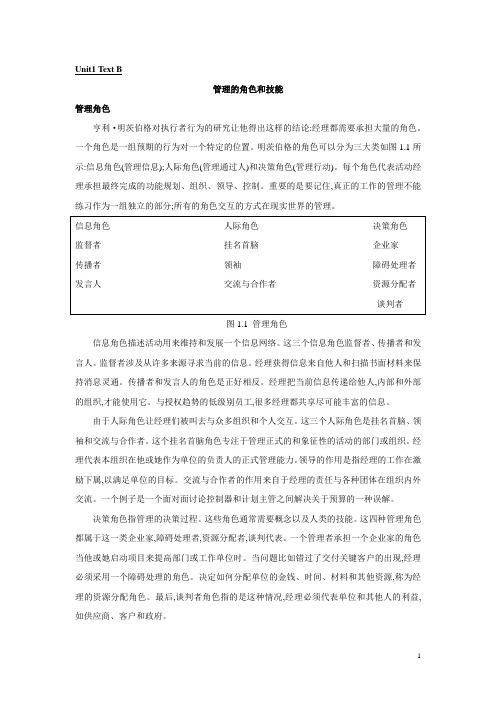
管理的角色和技能管理角色亨利·明茨伯格对执行者行为的研究让他得出这样的结论:经理都需要承担大量的角色。
一个角色是一组预期的行为对一个特定的位置。
明茨伯格的角色可以分为三大类如图1.1所示:信息角色(管理信息);人际角色(管理通过人)和决策角色(管理行动)。
每个角色代表活动经理承担最终完成的功能规划、组织、领导、控制。
重要的是要记住,真正的工作的管理不能练习作为一组独立的部分;所有的角色交互的方式在现实世界的管理。
图1.1 管理角色信息角色描述活动用来维持和发展一个信息网络。
这三个信息角色监督者、传播者和发言人。
监督者涉及从许多来源寻求当前的信息。
经理获得信息来自他人和扫描书面材料来保持消息灵通。
传播者和发言人的角色是正好相反。
经理把当前信息传递给他人,内部和外部的组织,才能使用它。
与授权趋势的低级别员工,很多经理都共享尽可能丰富的信息。
由于人际角色让经理们被叫去与众多组织和个人交互。
这三个人际角色是挂名首脑、领袖和交流与合作者。
这个挂名首脑角色专注于管理正式的和象征性的活动的部门或组织。
经理代表本组织在他或她作为单位的负责人的正式管理能力。
领导的作用是指经理的工作在激励下属,以满足单位的目标。
交流与合作者的作用来自于经理的责任与各种团体在组织内外交流。
一个例子是一个面对面讨论控制器和计划主管之间解决关于预算的一种误解。
决策角色指管理的决策过程。
这些角色通常需要概念以及人类的技能。
这四种管理角色都属于这一类企业家,障碍处理者,资源分配者,谈判代表。
一个管理者承担一个企业家的角色当他或她启动项目来提高部门或工作单位时。
当问题比如错过了交付关键客户的出现,经理必须采用一个障碍处理的角色。
决定如何分配单位的金钱、时间、材料和其他资源,称为经理的资源分配角色。
最后,谈判者角色指的是这种情况,经理必须代表单位和其他人的利益,如供应商、客户和政府。
根据一篇经典文章由罗伯特·l·卡茨,管理上的成功主要取决于性能而不是人格特质。
信息管理专业英语教程1 (5)

New Words
a variety of respond to depend on in addition on behalf of up to date keep up be aware of digital signature private key 多种的 响应,对…做出反应 依靠,依赖,视…而定 另外 代表… 最近的,最新的 维持,继续 知道 数字签名 私钥
司爱侠 侯安才 张强华 黄祝菲 编著
信息管理专业英语教程
人民邮电出版社
Unit 7
Security Technology
退出
New Words
security secure [si5kjuEriti] n.安全 [si5kjuE] adj.安全的,可靠的,放心的,无虑的 v.保护 [in5tru:dE] n.入侵者 [di5tekt] vt.察觉,发觉,侦查,探测 [Qn5ju:VuEl] adj.不平常的,与众不同的,
New Words
firewall [5faiEwC:l] n.防火墙 pretend [pri5tend] vt.假装,装扮,伪称 squash [skwCF] v.挤进,挤压 emission [i5miFEn] n.发射,喷射 genuine [5dVenjuin] adj.真实的,真正的,诚恳的 denial [di5naiEl] n.否认,否定,谢绝,拒绝 spoof [spu:f] v.哄骗 filter [5filtE] vt.筛选,过滤,渗透 eliminate [i5limineit] vt.排除,消除 criteria [krai5tiEriE] n.标准 discard [dis5kB:d] vt.丢弃,抛弃;放弃 sophisticated [sE5fistikeitid] adj.高度发展的,精 密复杂的
信息管理与信息系统专业英语:专业词汇的中英文翻译和具体英文介绍
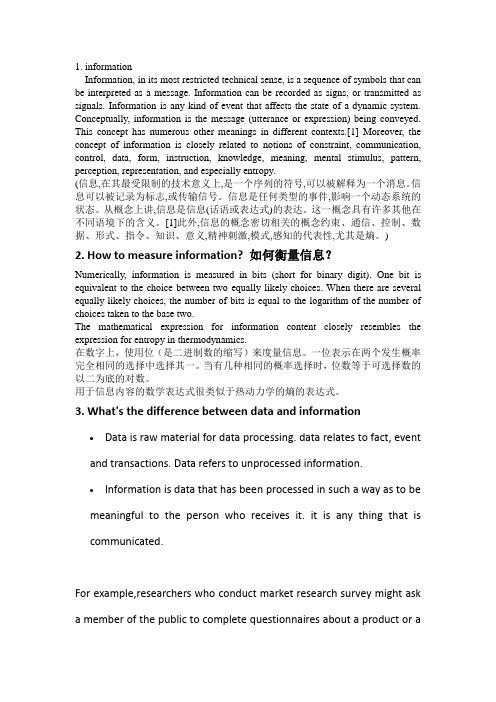
1. informationInformation, in its most restricted technical sense, is a sequence of symbols that can be interpreted as a message. Information can be recorded as signs, or transmitted as signals. Information is any kind of event that affects the state of a dynamic system. Conceptually, information is the message (utterance or expression) being conveyed. This concept has numerous other meanings in different contexts.[1] Moreover, the concept of information is closely related to notions of constraint, communication, control, data, form, instruction, knowledge, meaning, mental stimulus, pattern, perception, representation, and especially entropy.(信息,在其最受限制的技术意义上,是一个序列的符号,可以被解释为一个消息。
信息可以被记录为标志,或传输信号。
信息是任何类型的事件,影响一个动态系统的状态。
从概念上讲,信息是信息(话语或表达式)的表达。
这一概念具有许多其他在不同语境下的含义。
[1]此外,信息的概念密切相关的概念约束、通信、控制、数据、形式、指令、知识、意义,精神刺激,模式,感知的代表性,尤其是熵。
信息管理英语教程中英文对照翻译(一至四篇)
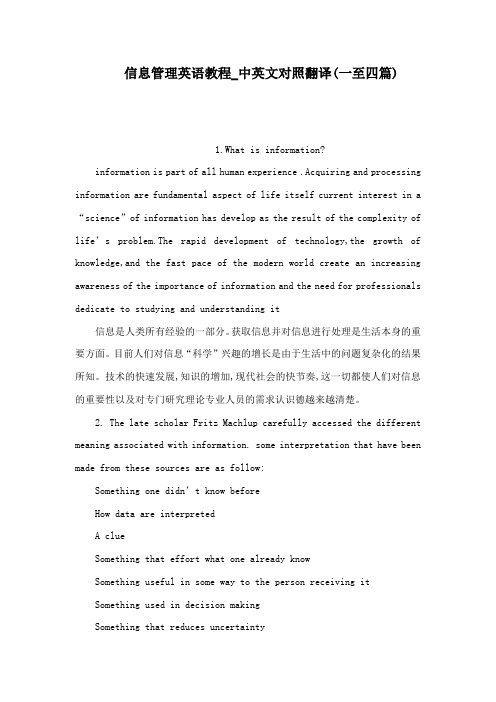
信息管理英语教程_中英文对照翻译(一至四篇)1.What is information?information is part of all human experience .Acquiring and processing information are fundamental aspect of life itself current interest in a “science”of information has develop as the result of the complexity of life’s problem.The rapid development of technology,the growth of knowledge,and the fast pace of the modern world create an increasing awareness of the importance of information and the need for professionals dedicate to studying and understanding it信息是人类所有经验的一部分。
获取信息并对信息进行处理是生活本身的重要方面。
目前人们对信息“科学”兴趣的增长是由于生活中的问题复杂化的结果所知。
技术的快速发展,知识的增加,现代社会的快节奏,这一切都使人们对信息的重要性以及对专门研究理论专业人员的需求认识德越来越清楚。
2. The late scholar Fritz Machlup carefully accessed the different meaning associated with information. some interpretation that have been made from these sources are as follow:Something one didn’t know beforeHow data are interpretedA clueSomething that effort what one already knowSomething useful in some way to the person receiving itSomething used in decision makingSomething that reduces uncertaintyThe meaning of word in sentencesSomething that provide more than what is statedSomething that changes what a person who receive it believes or expects晚学者弗里茨?马克卢普通过仔细分析这些相关信息的不同意义。
《管理英语教程》翻译

第一部分基础第一单元管理与管理者Ⅰ管理的定义管理是指这样一种过程:通过与他人协作,有效地做好正确的事。
这里的“过程”指管理者履行的基础管理职能。
效率指正确地完成任务,同时也指投入与产出之间的关系。
例如,在给定投入的情况下,更高的产出就意味着效率得到了提高。
由于可供管理者们投入的都是稀缺资源,他们就必须考虑如何高效率地利用这些资源。
因此,管理者们要考虑的问题是如何将所投入的资源成本最小化。
尽管效率很重要,但仅仅顾及到效率还不够。
管理者还必须考虑效果的问题。
效果是指作正确的事。
在一个组织中,效果即指达成组织目标。
虽然效率与效果是两个不同的术语,但它们却相互联系。
例如,如果忽略效率则更容易做到有效果。
举例来说,一些政府部门常常受到批评的原因是他们的工作效果良好,但效率极其低下。
换言之,这些政府部门达成了工作目标,但为此所投入的成本过高。
那么一个组织是否会只有效率而无效果可言呢?例如,高效率地完成错误的任务。
因此,称职的管理者会同时考虑达成目标与尽可能高地提高效率。
Ⅱ管理的基本职能管理有四大基本职能:计划、组织、领导和控制。
我们常常将每个过程看成是独立的任务,但管理者必须能够同时执行这四大职能,并且认识到这四大职能会相互影响。
计划包括确定组织目标,规划整体战略,进一步制定可以整合与协调各种活动的具体计划。
制定目标可以使事情重点突出,并且使组织成员的注意力集中在最重要的问题上。
组织包括决定要完成的任务,由谁来做,任务如何分组,下级向谁报告以及在组织的哪个层级做出决策。
领导包括激励雇员,指导员工活动,组建最有效的沟通渠道,化解雇员之间的矛盾。
管理职能的第四项是控制。
在确定目标,制订计划,理清工作安排之后,仍然会有一些事情出现差错。
为了保证所有的行动都能按照计划进行,管理者必须监督组织的绩效表现。
必须要把组织的实际表现与所做出的计划相对比,如果两者之间出现明显的背离,管理者就有责任将组织活动纠正到正确的轨道上来。
信息管理专业英语教程1

New Words
field application 用软件 usage interaction consider branch incorporate cognitive 的 perspective stakeholder [fi:ld] n.领域,区域 [7Apli5keiFEn] n.应用,应用程序,应
[5ju:sidV] n.使用,用法 [7intEr5AkFEn] n.交互作用 [kEn5sidE] vt.考虑,照顾,认为 [brB:ntF] n.枝,分枝 [in5kC:pEreit] v.合并,并入 [5kC^nitiv] adj.认知的,认识的,有感知 [pE5spektiv] n.远景,观点,看法,观点,观察 [5steikhEuldE] n.股东
New Words
perform [pE5fC:m] vt.履行,执行 database [5deitbeis] n.数据库 hardware [5hB:dwZE] n.硬件 administration [Edminis5treiFEn] n.管理,经营,行政部 门 communications [kEmju:ni5keiFEnz] n.通信 combine [kEm5bain] v.(使)联合,(使)结 合 describe [dis5kraib] v.描述 produce [prE5dju:s] n.产品 vt.提出,出示,生产 disseminate [di5semineit] vt.散布,传播(消息、观念 等) grasp [^rB:sp] vt.&n.抓住,抓紧,掌握,领会
New Words
iterative [5itErEtiv] adj.重复的,反复的,迭代的 principle [5prinsEpl] n.法则,原则,原理 design [di5zain] n.&v.设计,计划 support [sE5pC:t] vt.支持 convert [kEn5vE:t] vt.转变,变换 protect [prE5tekt] vt.保护 transmit [trAnz5mit] vt.传输,转送,传达,传导,传 播 encompass [in5kQmpEs] vt.包括,包含 recognizable [5rekE^naizEbl] adj.可认识的,可辨 认的,可公认的,可 认知的 professional [prE5feFEnl] n. 专业人员,职业艺人 adj.专业的,职业的
信管专业英语Unit1

• 集体利益重于个人利益。
• [4]Pursue vt. 继续;从事;追赶;纠缠 • vi. 追赶;继续进行 • We will pursue the subject of discussion tomorrow. • 我们明天继续讨论这个题目。 • Why should we even have
• [7]haphazard adj. 偶然的;随便的;无计划的
• The investigation does seem haphazard. • 这次调查似乎的确没有计划性。
• It was strings of words borrowed from the differe nt languages around them and put together in sort of haphazard ways.
• 其目的是“接近这个精灵”,然后再由它将所有 的设计决定注入其中。
• [16]downsizing n. 精简,裁员;缩小规模
• She wasn't sheded in the bout of downsizing.
• 在那次精简人员的大潮中,她幸运地保住了她的 工作。
• On downsizing, the first to go are those with few friends.
• The company is an outstanding example of a small business that grew into a big one.
• 该公司是小企业成长为大公司的突出例子。
英语信管专业1至6单元中英文结合

第一课1.信息社会信息社会是一个以信息创建、发布、传播、使用和管理为重要经济、政治和文化活动的社会。
知识经济是信息社会相应的经济部分,通过对经济开发的理解来创造财富。
这种社会的特点是普遍以信息技术为生产、经济和社会的中心。
信息社会被看作工业社会的后继者。
紧密相关的概念有后工业社会、后福特制、后现代社会、知识社会、信息通信社会、信息革命和网络社会。
2.信息科学信息科学(也称信息研究)是一个跨学科的领域,主要涉及信息的收集、分类、管理、储存、检索和传播。
一些人把信息科学看作图书馆的同义词,而其他人则认为这两个术语覆盖不同的领域。
信息科学研究知识在组织中的运用,以及人、组织和信息系统的交互作用。
它经常被(错误地)看作计算机科学的一个分支。
实际上,它是一个广泛的跨学科领域,不仅包括计算机科学,也包括数学、图书馆学、认知科学和社会科学。
信息科学的焦点是从涉及的利益相关方的观点看问题,然后应用信息和其他所需的技术。
换言之,它首先处理的是系统性的问题,而不是系统中的个别技术问题。
从这个角度来说,信息科学可以被看作对“技术决定论”的回应。
“技术决定论”认为“技术按照自己的规律发展,实现自己的潜能,只受可用物质资源的限制,因此必须被看作一个自治系统,它控制并最终渗透到社会的各个子系统中”。
在信息科学中,最近几年人们一直在关注人一机交互、组件、语义网、按价值设计、迭代设计过程和人们建立、使用和发现信息的方法。
今天这个领域被叫做“信息领域”,有越来越多的信息学校和信息学院出现。
不应该把信息科学与信息论混淆。
信息论研究信息的特定数学概念或图书馆学(与图书馆相关的领域,它使用信息科学的一些原理)。
3.信息技术按照美国信息技术协会(ITAA)的定义,信息技术(IT)是“研究、设计、开发、执行、支持或管理基于计算机的信息系统,特别是在软件应用和计算机硬件方面。
”IT涉及使用电子计算机和计算机软件来转换、存储、保护、处理、传输并安全检索信息。
unit 2 reading material参考译文
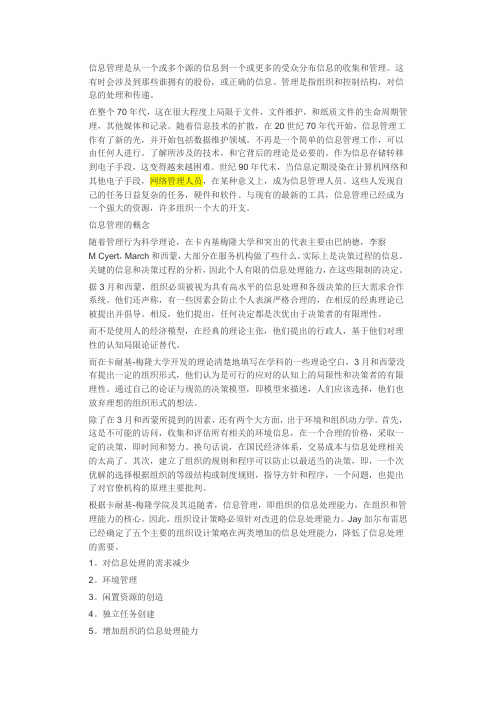
信息管理是从一个或多个源的信息到一个或更多的受众分布信息的收集和管理。
这有时会涉及到那些谁拥有的股份,或正确的信息。
管理是指组织和控制结构,对信息的处理和传递。
在整个70年代,这在很大程度上局限于文件,文件维护,和纸质文件的生命周期管理,其他媒体和记录。
随着信息技术的扩散,在20世纪70年代开始,信息管理工作有了新的光,并开始包括数据维护领域。
不再是一个简单的信息管理工作,可以由任何人进行。
了解所涉及的技术,和它背后的理论是必要的。
作为信息存储转移到电子手段,这变得越来越困难。
世纪90年代末,当信息定期浸染在计算机网络和其他电子手段,网络管理人员,在某种意义上,成为信息管理人员。
这些人发现自己的任务日益复杂的任务,硬件和软件。
与现有的最新的工具,信息管理已经成为一个强大的资源,许多组织一个大的开支。
信息管理的概念随着管理行为科学理论,在卡内基梅隆大学和突出的代表主要由巴纳德,李察M Cyert,March和西蒙,大部分在服务机构做了些什么,实际上是决策过程的信息。
关键的信息和决策过程的分析,因此个人有限的信息处理能力,在这些限制的决定。
据3月和西蒙,组织必须被视为具有高水平的信息处理和各级决策的巨大需求合作系统。
他们还声称,有一些因素会防止个人表演严格合理的,在相反的经典理论已被提出并倡导。
相反,他们提出,任何决定都是次优由于决策者的有限理性。
而不是使用人的经济模型,在经典的理论主张,他们提出的行政人,基于他们对理性的认知局限论证替代。
而在卡耐基-梅隆大学开发的理论清楚地填写在学科的一些理论空白,3月和西蒙没有提出一定的组织形式,他们认为是可行的应对的认知上的局限性和决策者的有限理性。
通过自己的论证与规范的决策模型,即模型来描述,人们应该选择,他们也放弃理想的组织形式的想法。
除了在3月和西蒙所提到的因素,还有两个大方面,出于环境和组织动力学。
首先,这是不可能的访问,收集和评估所有相关的环境信息,在一个合理的价格,采取一定的决策,即时间和努力。
信息管理专业英语翻译
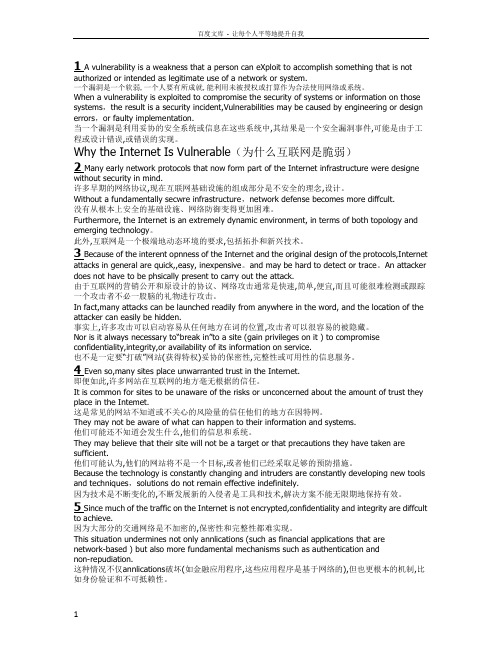
1 A vulnerability is a weakness that a person can eXploit to accomplish something that is not authorized or intended as legitimate use of a network or system.一个漏洞是一个软弱,一个人要有所成就,能利用未被授权或打算作为合法使用网络或系统。
When a vulnerability is exploited to compromise the security of systems or information on those systems,the result is a security incident,Vulnerabilities may be caused by engineering or design errors,or faulty implementation.当一个漏洞是利用妥协的安全系统或信息在这些系统中,其结果是一个安全漏洞事件,可能是由于工程或设计错误,或错误的实现。
Why the Internet Is Vulnerable(为什么互联网是脆弱)2 Many early network protocols that now form part of the Internet infrastructure were designe without security in mind.许多早期的网络协议,现在互联网基础设施的组成部分是不安全的理念,设计。
Without a fundamentally secwre infrastructure,network defense becomes more diffcult.没有从根本上安全的基础设施、网络防御变得更加困难。
Furthermore, the Internet is an extremely dynamic environment, in terms of both topology and emerging technology。
- 1、下载文档前请自行甄别文档内容的完整性,平台不提供额外的编辑、内容补充、找答案等附加服务。
- 2、"仅部分预览"的文档,不可在线预览部分如存在完整性等问题,可反馈申请退款(可完整预览的文档不适用该条件!)。
- 3、如文档侵犯您的权益,请联系客服反馈,我们会尽快为您处理(人工客服工作时间:9:00-18:30)。
Unit 11. Management is the attainment of organizational goals in an effective and efficient manner through planning, organizing, leading, and controlling organizational resources.管理就是通过计划、组织、领导和控制组织资源,有效率有效果地实现组织的目标。
2. Planning defines where the organization wants to be in the future and how to get there.计划定义了组织未来要实现的蓝图以及如何去实现它。
3. Organization failure can occur when managers are not serious about control or lack control information.当管理者不能严肃对待控制或者缺少控制信息时,组织可能发生失败。
4. The ultimate responsibility of managers is to achieve high performance, which is the attainment of organizational goals by using resources in an efficient and effective manner.管理人员的最终责任是获得高业绩,而这是有效率有效果地运用资源而达成的组织目标。
5. There are no ‘people less’organizations, so managers must learn how to motivate, lead and communicate; they must also understand interpersonal relations and the behavior of groups of people.“无人”的组织是不存在的,所以管理者必须知道如何激励、领导和沟通,还必须理解人际关系和群体行为。
6. Managers are excellent communicators and value shapers,lightning rods to get the job done.管理者是卓越的沟通者和价值塑造者,指挥完成工作。
7. It is now apparent that overly centralized, excessively layered, and rigid organizational structures are not always effective or efficient.现在很清楚的是,过于集中、过度分层、以及过于严格的组织结构并不是总有效或者有效率的。
8. A manager frequently reminds his or her management team of the company’s goals and how well those goals are being achieved.一个管理者会不断提醒他或她的管理团队组织的目标以及目标的完成情况。
9. Strategic planning is the process of developing and analyzing the organization’s mission, overa ll goals, general strategies, and allocating resources.战略规划是开发和分析组织的使命、总体目标、总体战略以及分配资源的过程。
10. The purpose of the organizing function is to make the best use of the organization’s resources to achieve organizational goals.组织职能的目的是为了充分地利用组织的资源去实现组织目标。
Unit 21.As used in a broader sense, statistics refers to the statistical tools used to collect, present, analyze, and interpret data for the purpose of making more effective decisions. 广泛的意义上说,统计就是为了做出有效的决策而用于收集、提出、分析、解释数据的统计工具。
2.Statistical thinking is necessary not only for efficient citizenship, but also for effective decision making in various facets of business. 统计思想不仅是对于有效的公民有用,对于在企业经营的各个层面做出有效决策也是必要的。
3.W.Edwards Deming, noted statistician and quality control expert, insisted that we should start statistics education before high school. W.爱德华兹·戴明——著名的统计学家和质量控制专家——坚持认为人们在高中之前就应该开始统计教育。
4.Just as attorneys have “rules of evidence”and accountants have “commonly accepted practices”, persons dealing with numerical data follow some standard guidelines.正如律师有“关于证据的法规”和会计有“通常接受的惯例”一样,处理数字数据的人也遵循一些标准的指南。
5.Masses of unorganized numerical data, such as the census of population, are of little value as is, however, statistical techniques are available to organize this type of data into a meaningful form.大量的未加工的数字数据,例如人口普查,原数据只有很少的价值,然而,运用统计方法可以把这类数据加工成一个有意义的形式。
6.To infer something about a population, we usually take a sample from the population. 为了推断一个总体的某些情况,人们通常从总体中选取一个样本。
7.Much of the appeal of statistical method is that they allow us to describe, predict, and sometimes control the world around us.大部分统计方法的引人之处在于它们允许人们描述、预测、并且有时间控制周围的世界。
rmation developed through the use of statistics has enhanced our studying of how life works, helped us learn about each other, allow control over some societal issues, and helped individuals make informed decisions. 通过使用统计加工的信息已经提高了人们对生活如何运作的研究,帮助了人们了解彼此,允许对一些社会问题进行控制,并且帮助个人做出明智的决定。
9.A representative sample can be used to make inferences about a larger population, but descriptive statistics are the only useful results for an unrepresentative sample.一个代表性的样本可以用来做出关于较大总体的推论,但是只有描述统计能得出对没有代表性样本的有用结果。
10.When the individuals measured constitute the whole population, there is no need for statistical inference because the truth is known.当被测量的个体构成了整个总体,就没有统计推断的必要了,因为事实已经知道了。
Unit 31.All information, from train schedules to discount-price goods, will be as close as the press of a key所有信息,从火车时刻表到折扣价商品,只需按一下按钮就能得到。
2.The children have a happy environment at school.孩子们在学校有一个快乐的环境3.The manufacturer invoiced our company for two typewriters.制造厂家给我们公司开了一张两台打字机的发票。
4.My accounts balance for the first time this year!我的账上今年第一次出现了收支平衡!5.The Eiffel Tower is one of the most famous structures in the world.埃菲尔铁塔是世界上最著名的建筑物之一。
6.Please program the computer to do the job instead of manual operation.请给电脑编制一个程序做这项工作以此代替手工操作。
7.The binary system of numbers is used in digital computers.数字计算机都使用二进制数字系统。
8.The motherboard is main board of a computer, usually containing the circuitry for the central processing unit, keyboard, and monitor and often having slots for accepting additional circuitry.计算机的主要部分是主板,通常包括中央处理单元的电路系统、键盘、显示器和为了接受额外的电路所安置的插槽。
